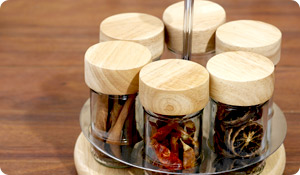
If you cook at all, chances are you have used the spice Turmeric. You may know it best as one of the main ingredients in curry recipes. Turmeric doesn't just add spice to your food; it has been used for more than 5,000 years in India, China, and ancient Egypt for its extensive healing powers.
The active ingredient in Turmeric is Curcumin, a biologically active photochemical. Curcumin is a member of the ginger family. Its roots and underground stems are crushed and ground into turmeric. This is what gives it its yellow color. In the human body, Curcumin is associated with more than 700 genes.
Curcumin may reduce-or even prevent-Crohn's disease and ulcerative colitis. This powerhouse ingredient is anti-inflammatory, anti-carcinogen, anti-oxidant, anti-viral, and anti-fungal. It is effective in alleviating the discomfort caused by Crohn's symptoms. Curcumin may also be a neurological protective agent.
How Does Curcumin Work?
Plants and roots naturally manufacture chemicals that prevent insect attacks. These same chemicals also offer health benefits when humans ingest them. Researchers believe Curcumin affects cell membranes, which modulate the flow of chemical signals to and from cells involved in chronic inflammation. Curcumin interferes in the transmission of these messages, so it actually controls the flow of information. It also inhibits enzymes that are associated with inflammation, and research shows it may modulate more than 700 genes in humans.
In the body, Turmeric decreases congestion and inflammation in mucus membranes by coating organs, such as the small intestine. It also has antibacterial properties so it prevents infection. This makes Turmeric especially helpful for patients who have recently had surgery and are at higher risk of infection.
Curcumin mimics the action of TNF blockers, which are medications used in treating inflammation caused by Crohn's disease. TNF-a (Tumor Necrosis Factor-a) is a gene that binds to cells and triggers inflammation in our body.
Fortunately, there are no known side effects from turmeric in humans, and it is not toxic up to 8,000 milligrams per day. Turmeric is sold as a dietary supplement; the Food and Drug Administration does not regulate it. You can use it as a spice, brew it as a tea, or purchase it the form of a tincture, capsule, table, ointment or paste.
If you are pregnant or have gallstones, are undergoing chemotherapy treatment or taking blood thinners, check with your physician before taking turmeric.
Sources:
http://www.turmericinfo.com/curcumin_crohnsdisease.html
http://www.turmeric-curcumin.com/
http://www.ars.usda.gov/is/pr/2009/090406.htm
http://www.sciencedaily.com/releases/2009/03/090306172615.htm
http://www.cancer.org/docroot/ETO/content/ETO_5_3X_Turmeric.asp?sitearea=ETO





